education
-
 Open Online Course in Science and Technology, STAR-MOOC
Four universities specializing in science and technology, along with POSTECH and UST, teamed up to establish programs for innovation in education programs, responding to the Fourth Industrial Revolution.
KAIST held an opening ceremony for the Science & Technology Advanced Research - Massive Open Online Course (STAR-MOOC) and signed an MoU with GIST, DGIST, UNIST, POSTECH, and UST.
STAR-MOOC was launched on February 26 to provide educational service to the public. It is a joint platform where people can take courses featuring lectures from professors from universities specializing in science and technology as well as national research universities.
It offers 15 courses covering basics, majors, and electives related to science and technology developed by the STAR-MOOC committee. Students can take a variety of courses.
At the opening ceremony, KAIST President Sung-Chul Shin, DGIST President Sang Hyuk Son, UST President Kil Choo Moon, POSTECH Vice President Wankyun Chung, UNIST Vice President Jae Sung Lee, GIST Vice President of Public Affairs Pil-hwan Park came to sign the MoU for provising educational services for the public.
During the ceremony, there was also time to introduce a technical agreement with a non-profit organization founded by NAVER, the CONNECT Foundation, for its courses and platform.
Universities participating in STAR-MOOC will put effort into capacity building in response to changes driven by the Fourth Industrial Revolution.
President Shin said, “STAR-MOOC is a platform that provides science and technology courses from basics to electives and major courses. It will become a leading educational platform.”
Students can register and choose courses from the website (http://starmooc.kr).
2018.03.19 View 9657
Open Online Course in Science and Technology, STAR-MOOC
Four universities specializing in science and technology, along with POSTECH and UST, teamed up to establish programs for innovation in education programs, responding to the Fourth Industrial Revolution.
KAIST held an opening ceremony for the Science & Technology Advanced Research - Massive Open Online Course (STAR-MOOC) and signed an MoU with GIST, DGIST, UNIST, POSTECH, and UST.
STAR-MOOC was launched on February 26 to provide educational service to the public. It is a joint platform where people can take courses featuring lectures from professors from universities specializing in science and technology as well as national research universities.
It offers 15 courses covering basics, majors, and electives related to science and technology developed by the STAR-MOOC committee. Students can take a variety of courses.
At the opening ceremony, KAIST President Sung-Chul Shin, DGIST President Sang Hyuk Son, UST President Kil Choo Moon, POSTECH Vice President Wankyun Chung, UNIST Vice President Jae Sung Lee, GIST Vice President of Public Affairs Pil-hwan Park came to sign the MoU for provising educational services for the public.
During the ceremony, there was also time to introduce a technical agreement with a non-profit organization founded by NAVER, the CONNECT Foundation, for its courses and platform.
Universities participating in STAR-MOOC will put effort into capacity building in response to changes driven by the Fourth Industrial Revolution.
President Shin said, “STAR-MOOC is a platform that provides science and technology courses from basics to electives and major courses. It will become a leading educational platform.”
Students can register and choose courses from the website (http://starmooc.kr).
2018.03.19 View 9657 -
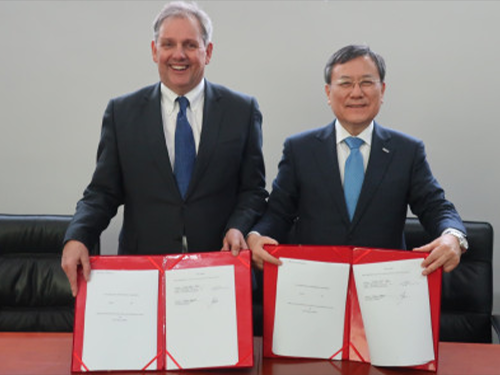 KAIST to Host the THE Innovation & Impact Summit in 2019
KAIST and Times Higher Education (THE) agreed to co-host the THE Innovation & Impact Summit at KAIST from April 1 to 3, 2019.
Global leaders from higher education, government, and industry will gather at KAIST to discuss how universities can better innovate for creating a greater impact.
(from left: THE Managing Director Trevor Barratt and KAIST President Sung-Chul Shin)
President Sung-Chul Shin and Trevor Barratt, managing director at the THE, signed an agreement to host the 2019 THE Innovation & Impact Summit at KAIST next April. The agreement was signed on February 6 during the THE Asia Universities Summit held at SUSTech in Shenzhen in China. Phil Baty, editorial director at the THE was also present during the agreement.
By hosting the 2019 THE Innovation & Impact Summit, KAIST has a chance to introduce its innovative research and performance and its educational environment and startup ecosystem to the world. Having educational and industrial leaders meet at KAIST will add more power to the global status and capacity of KAIST.
The THE Innovation & Impact Summit, first held in 2017, is one in the seven presidential summit series held by THE. During the second summit at KAIST, THE will launch their world university innovation rankings for the first time.
As innovation at universities and its impact have been a crucial indicator in building an institutional brand and reputation, leading universities are gearing up to encourage startups and entrepreneurship education. Even more, innovation at universities is emerging as one of the growth engines of economies.
The innovation indicators of KAIST have been highly recognized by many global ranking institutions in terms of the volume of patents and the patents-to-article citation impact. Thomson Reuters has recognized KAIST for two consecutive years as the most innovative university in Asia, and sixth in the world.
President Shin has high expectations for the hosting of the Innovation & Impact Summit at KAIST. He explained, “Innovation makes up the DNA of KAIST and it has been our institutional mission from the start in 1971. KAIST was commissioned to make innovation for industrialization and economic development through education and research. I do not see any university more suitable than KAIST to host this innovation summit. I hope the summit at KAIST will serve as a global platform to provide very creative ideas for making innovation and collaboration among the leading universities for all the participants.”
Meanwhile, at the THE Asia Universities Summit in Shenzhen, how to respond to the implications of the Fourth Industrial Revolution was the key agenda piercing the two-day sessions.
As a panelist, President Shin shared his experiences on innovative strategies viable for spearheading university reform for the Fourth Industrial Revolution, along with Vice-Chancellor of the University of Sheffield Sir Keith Burnett, President of Monash University Margaret Gardner, and President of Hong Kong Polytechnic University President Timothy W. Tong. He said that universities should foster young talents by equipping them with creativity, collaboration, and convergent minds. To swiftly respond to the new industrial environment, President Shin said that universities should remove the high barriers between departments and establish cross- and inter-disciplinary education systems, convergence research and technology commercialization.
2018.02.06 View 10417
KAIST to Host the THE Innovation & Impact Summit in 2019
KAIST and Times Higher Education (THE) agreed to co-host the THE Innovation & Impact Summit at KAIST from April 1 to 3, 2019.
Global leaders from higher education, government, and industry will gather at KAIST to discuss how universities can better innovate for creating a greater impact.
(from left: THE Managing Director Trevor Barratt and KAIST President Sung-Chul Shin)
President Sung-Chul Shin and Trevor Barratt, managing director at the THE, signed an agreement to host the 2019 THE Innovation & Impact Summit at KAIST next April. The agreement was signed on February 6 during the THE Asia Universities Summit held at SUSTech in Shenzhen in China. Phil Baty, editorial director at the THE was also present during the agreement.
By hosting the 2019 THE Innovation & Impact Summit, KAIST has a chance to introduce its innovative research and performance and its educational environment and startup ecosystem to the world. Having educational and industrial leaders meet at KAIST will add more power to the global status and capacity of KAIST.
The THE Innovation & Impact Summit, first held in 2017, is one in the seven presidential summit series held by THE. During the second summit at KAIST, THE will launch their world university innovation rankings for the first time.
As innovation at universities and its impact have been a crucial indicator in building an institutional brand and reputation, leading universities are gearing up to encourage startups and entrepreneurship education. Even more, innovation at universities is emerging as one of the growth engines of economies.
The innovation indicators of KAIST have been highly recognized by many global ranking institutions in terms of the volume of patents and the patents-to-article citation impact. Thomson Reuters has recognized KAIST for two consecutive years as the most innovative university in Asia, and sixth in the world.
President Shin has high expectations for the hosting of the Innovation & Impact Summit at KAIST. He explained, “Innovation makes up the DNA of KAIST and it has been our institutional mission from the start in 1971. KAIST was commissioned to make innovation for industrialization and economic development through education and research. I do not see any university more suitable than KAIST to host this innovation summit. I hope the summit at KAIST will serve as a global platform to provide very creative ideas for making innovation and collaboration among the leading universities for all the participants.”
Meanwhile, at the THE Asia Universities Summit in Shenzhen, how to respond to the implications of the Fourth Industrial Revolution was the key agenda piercing the two-day sessions.
As a panelist, President Shin shared his experiences on innovative strategies viable for spearheading university reform for the Fourth Industrial Revolution, along with Vice-Chancellor of the University of Sheffield Sir Keith Burnett, President of Monash University Margaret Gardner, and President of Hong Kong Polytechnic University President Timothy W. Tong. He said that universities should foster young talents by equipping them with creativity, collaboration, and convergent minds. To swiftly respond to the new industrial environment, President Shin said that universities should remove the high barriers between departments and establish cross- and inter-disciplinary education systems, convergence research and technology commercialization.
2018.02.06 View 10417 -
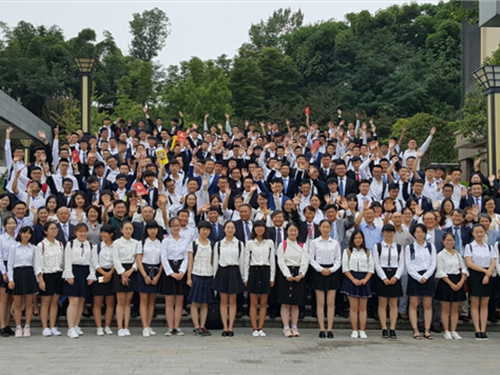 CLKIP Bearing Fruit in China
The Chongqing Liangjiang KAIST International Program (CLKIP) is rapidly gaining steam in China. CLKIP, an educational program operated in Chongqing internationally by KAIST since 2015, offers two majors, Electronic Information Engineering and Computer Science and Technology, applying the same curriculum as at KAIST.
To operate the program, KAIST assigns professors from the School of Electrical Engineering and the School of Computing to the program every year. They are in charge of one-third of the major courses, and transfer KAIST’s educational curriculum and know-how.
A total of 13 professors from Chongqing University of Technology (CQUT) have received or are receiving training on advanced education methodologies and technical know-how, including an on and offline integrated learning program, called Education 4.0 and large-scale internet open learning.As CLKIP is gaining in popularity, the number of students for its undergraduate courses keeps increasing, from 66 in 2015 to 172 in 2016 and 200 students in 2017, achieving the student volume for enrollment annually.
CLKIP selected seven exchange undergraduate students and five dual-degree students this fall, and they are currently studying in KAIST for either one semester or one full year.
CLKIP is located in Chongqing, one of the major direct-controlled municipalities and a focal point for notable government projects. The Korea-China industrial zone is also located in this area.
Considering its location, CLKIP is more than just an international programs for educational cooperation. The program will provide opportunities to cooperate with Korean enterprises including Hyundai, SK Hynix, LG Chem and Hankook Tire. While cooperating in research and development as well as technical assistance, KAIST hopes that these enterprises will play a bridging role for KAIST alumni entering the Chinese market.
President Sung-Chul Shin said, “The success of CLKIP shows that KAIST programs for fostering future manpower and developing cutting-edge technologies do work in other countries. Based on this case, KAST will put more effort into transferring our innovative education systems abroad. We are also pushing ahead to establish a joint institute between KAIST and CQUT by 2018, which will become a foundation for facilitating the entry of KAIST’s cutting-edge technologies into the Chinese market.”
“KAIST aims to become an entrepreneurial university that creates value through technology commercialization. In this sense, KAIST plans to transfer advanced technologies to domestic and international companies located in the Liangjiang district,” he added.
2017.12.12 View 12897
CLKIP Bearing Fruit in China
The Chongqing Liangjiang KAIST International Program (CLKIP) is rapidly gaining steam in China. CLKIP, an educational program operated in Chongqing internationally by KAIST since 2015, offers two majors, Electronic Information Engineering and Computer Science and Technology, applying the same curriculum as at KAIST.
To operate the program, KAIST assigns professors from the School of Electrical Engineering and the School of Computing to the program every year. They are in charge of one-third of the major courses, and transfer KAIST’s educational curriculum and know-how.
A total of 13 professors from Chongqing University of Technology (CQUT) have received or are receiving training on advanced education methodologies and technical know-how, including an on and offline integrated learning program, called Education 4.0 and large-scale internet open learning.As CLKIP is gaining in popularity, the number of students for its undergraduate courses keeps increasing, from 66 in 2015 to 172 in 2016 and 200 students in 2017, achieving the student volume for enrollment annually.
CLKIP selected seven exchange undergraduate students and five dual-degree students this fall, and they are currently studying in KAIST for either one semester or one full year.
CLKIP is located in Chongqing, one of the major direct-controlled municipalities and a focal point for notable government projects. The Korea-China industrial zone is also located in this area.
Considering its location, CLKIP is more than just an international programs for educational cooperation. The program will provide opportunities to cooperate with Korean enterprises including Hyundai, SK Hynix, LG Chem and Hankook Tire. While cooperating in research and development as well as technical assistance, KAIST hopes that these enterprises will play a bridging role for KAIST alumni entering the Chinese market.
President Sung-Chul Shin said, “The success of CLKIP shows that KAIST programs for fostering future manpower and developing cutting-edge technologies do work in other countries. Based on this case, KAST will put more effort into transferring our innovative education systems abroad. We are also pushing ahead to establish a joint institute between KAIST and CQUT by 2018, which will become a foundation for facilitating the entry of KAIST’s cutting-edge technologies into the Chinese market.”
“KAIST aims to become an entrepreneurial university that creates value through technology commercialization. In this sense, KAIST plans to transfer advanced technologies to domestic and international companies located in the Liangjiang district,” he added.
2017.12.12 View 12897 -
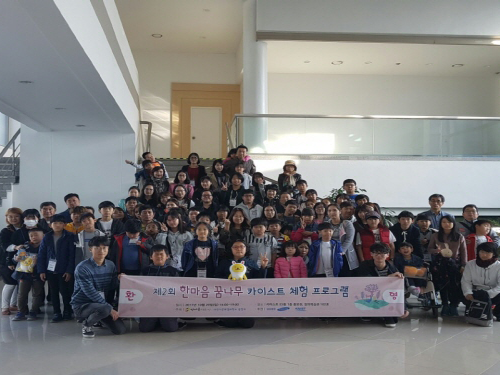 Hanmaeum Education Corps Invites Multicultural Families
About 100 graduates from the Multicultural Mother Schools and their families visited the KAIST campus on October 29 at the invitation of the Hanmaeum Education Corps of KAIST. The Hanmanum Education Corps is a volunteering organization composed of KAIST faculty and students. Many retired KAIST faculties are also members of the corps. Byong Kyu Choi, an Emeritus Professor from the Department of Industrial and Systems Engineering, is the director of the corps and has been leading the event since 2015.
With the support of a KAIST educational volunteering organization called SEED(Social Education Embracing Diversity), this year’s event offered various activities including a treasure hunt and convergent science programs. Participants had the opportunity to experience KAIST’s educational environment and enjoyed the perfect autumn weather during outdoor activities with student volunteers.
Children enjoyed making illumination-music stickers with the KAIST students, even though it was tough to learn at first.
While the children engaged themselves in the science program, parents visited the chrysanthemum fair and some of KAIST’s cafeterias.
Hanmaeum Education Corps opened the Multicultural Mother Schools to support multicultural mothers so that they can have more interest in and help their children more with their education. Since its establishment in 2015, the Multicultural Mother Schools have been expanding throughout the country.
The corporation hopes that visiting a renowned university will encourage children from multicultural families to study hard in addition to offering self-enrichment opportunities through career exploration and science activities.
2017.10.30 View 5789
Hanmaeum Education Corps Invites Multicultural Families
About 100 graduates from the Multicultural Mother Schools and their families visited the KAIST campus on October 29 at the invitation of the Hanmaeum Education Corps of KAIST. The Hanmanum Education Corps is a volunteering organization composed of KAIST faculty and students. Many retired KAIST faculties are also members of the corps. Byong Kyu Choi, an Emeritus Professor from the Department of Industrial and Systems Engineering, is the director of the corps and has been leading the event since 2015.
With the support of a KAIST educational volunteering organization called SEED(Social Education Embracing Diversity), this year’s event offered various activities including a treasure hunt and convergent science programs. Participants had the opportunity to experience KAIST’s educational environment and enjoyed the perfect autumn weather during outdoor activities with student volunteers.
Children enjoyed making illumination-music stickers with the KAIST students, even though it was tough to learn at first.
While the children engaged themselves in the science program, parents visited the chrysanthemum fair and some of KAIST’s cafeterias.
Hanmaeum Education Corps opened the Multicultural Mother Schools to support multicultural mothers so that they can have more interest in and help their children more with their education. Since its establishment in 2015, the Multicultural Mother Schools have been expanding throughout the country.
The corporation hopes that visiting a renowned university will encourage children from multicultural families to study hard in addition to offering self-enrichment opportunities through career exploration and science activities.
2017.10.30 View 5789 -
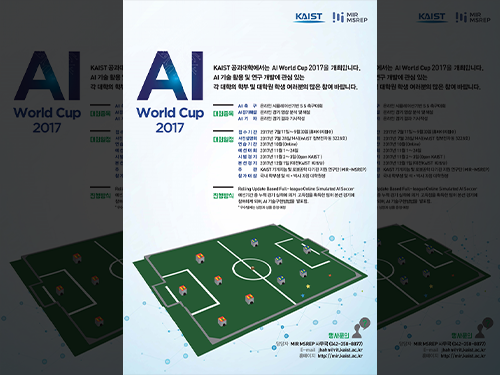 KAIST to Host the 2017 AI World Cup in November
KAIST, the birthplace of the Robot World Cup in 1996, now presents a new technology matchup, the AI World Cup this November, which will be held at KAIST. The event is being organized by the Machine Intelligence and Robotics Multi-Sponsored Research and Education Platform (MIR-MSREP) of KAIST. The online, simulated AI soccer game, based on rolling updates, will be a draw for avid online gamers and tech-savvy university students from around the nation.
The tournament is comprised of three events: ▲A 5 on 5 AI soccer match to be played after self-learning using AI technology in an online simulation environment ▲Commentary in which online soccer videos are analyzed and commented on, and ▲Game reporters who will write articles on online soccer event results.
The participants will undergo a month-long online practice period in October and compete in preliminary matches from November 1 through 24. The top teams that scored the highest accumulated points will compete in the finals on December 1. In the finals, each team’s AI technology implementation method will be evaluated to select the final winning team. To ensure a successful event, KAIST will host a briefing session for participants on July 28.
Technological prowess and early exposure to AI accumulated at KAIST led to the launching of this tournament. Professor Jong-Hwan Kim, the chair of the Organizing Committee of the AI World Cup, hosted the first ever Robot World Cup back in 1996. His concept has now evolved into the emerging technology of AI and the members of the Organizing Committee encompass the professors from the various departments of electrical engineering, computing, industrial and systems engineering, aerospace engineering, civil and environmental engineering, and the graduate schools of Green Transportation, Cultural Technology, and Science and Technology Policy.
In particular, ongoing convergence research initiatives incorporating AI into a wide arrays of disciplines such as bio, nano, and IT, played a crucial role for making this AI World Cup happen. Professor Kim said, “The winner of this year’s competition will be awarded a certificate and a small gift. In 2018, we aim to expand the event to an international scale by allowing international teams.”
Any undergraduate or graduate student in Korea can apply to participate in the ‘AI World Cup 2017’. KAIST will host a public trial event during the ‘Open KAIST’ event period to be held November 2-3 to help participating students understand the event better. ‘Open KAIST’ allows the general public to personally visit and experience what goes on in engineering departments and laboratories on the KAIST main campus. It is hosted by the College of Engineering every two years and is the largest event hosted by KAIST.
To participate in the ‘AI World Cup 2017,’ teams consisting of Korean undergraduates or graduate students can fill out application forms and submit them by September 30 on http://mir.kaist.ac.kr .
2017.07.14 View 13173
KAIST to Host the 2017 AI World Cup in November
KAIST, the birthplace of the Robot World Cup in 1996, now presents a new technology matchup, the AI World Cup this November, which will be held at KAIST. The event is being organized by the Machine Intelligence and Robotics Multi-Sponsored Research and Education Platform (MIR-MSREP) of KAIST. The online, simulated AI soccer game, based on rolling updates, will be a draw for avid online gamers and tech-savvy university students from around the nation.
The tournament is comprised of three events: ▲A 5 on 5 AI soccer match to be played after self-learning using AI technology in an online simulation environment ▲Commentary in which online soccer videos are analyzed and commented on, and ▲Game reporters who will write articles on online soccer event results.
The participants will undergo a month-long online practice period in October and compete in preliminary matches from November 1 through 24. The top teams that scored the highest accumulated points will compete in the finals on December 1. In the finals, each team’s AI technology implementation method will be evaluated to select the final winning team. To ensure a successful event, KAIST will host a briefing session for participants on July 28.
Technological prowess and early exposure to AI accumulated at KAIST led to the launching of this tournament. Professor Jong-Hwan Kim, the chair of the Organizing Committee of the AI World Cup, hosted the first ever Robot World Cup back in 1996. His concept has now evolved into the emerging technology of AI and the members of the Organizing Committee encompass the professors from the various departments of electrical engineering, computing, industrial and systems engineering, aerospace engineering, civil and environmental engineering, and the graduate schools of Green Transportation, Cultural Technology, and Science and Technology Policy.
In particular, ongoing convergence research initiatives incorporating AI into a wide arrays of disciplines such as bio, nano, and IT, played a crucial role for making this AI World Cup happen. Professor Kim said, “The winner of this year’s competition will be awarded a certificate and a small gift. In 2018, we aim to expand the event to an international scale by allowing international teams.”
Any undergraduate or graduate student in Korea can apply to participate in the ‘AI World Cup 2017’. KAIST will host a public trial event during the ‘Open KAIST’ event period to be held November 2-3 to help participating students understand the event better. ‘Open KAIST’ allows the general public to personally visit and experience what goes on in engineering departments and laboratories on the KAIST main campus. It is hosted by the College of Engineering every two years and is the largest event hosted by KAIST.
To participate in the ‘AI World Cup 2017,’ teams consisting of Korean undergraduates or graduate students can fill out application forms and submit them by September 30 on http://mir.kaist.ac.kr .
2017.07.14 View 13173 -
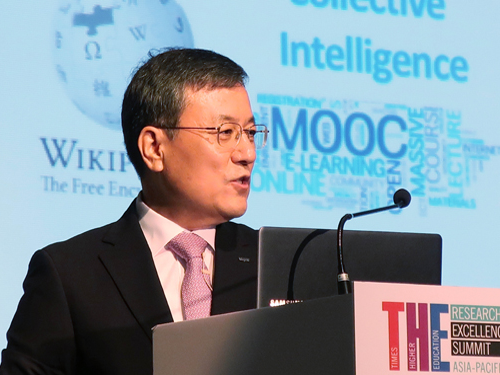 Reform of Universities Key in the Wake of the 4th Industrial Revolution
(President Shin makes a keynote speech at the Times Higher Education Research Excellence Summit held in Taiwan on July 4.)
KAIST President Sung-Chul Shin stressed that innovations in education, research, and technology commercialization of universities are critical for responding to the transformations that the Fourth Industrial Revolution will bring about.
In his keynote speech at the Times Higher Education Research Excellence Summit held in Taiwan on July 4, he cited connectivity, superintelligence, and convergence in science and technology as three components the Fourth Industrial Revolution will pierce, saying the speed and breadth of the transformation will be beyond our imagination. He also presented megatrends in science and technology in the years to come and how KAIST is addressing the challenges and opportunities.
“It is imperative to foster creative young talents fluent in convergence, collaboration, and communication skills in the new era. To this end, we need to focus on whole brain education by enhancing basic education in science and engineering plus humanities and social studies,” he stressed. He also presented a Non-Departmental Education Track, which KAIST plans to implement from next semester. The track, designed to prepare students for the new industrial era, will focus on whole brain education including entrepreneurship and leadership education during the undergraduate period.
He also emphasized an effective new teaching methodology. “We need to develop various new teaching methods. The paradigm should shift from lecturer-centered to student-centered. KAIST is revising our curriculum to facilitate team-based, project-based learning and flipped learning,” he explained.
President Shin also pointed out that the educational goals for the next generation should be to sustain the value of people’s own thoughtfulness, wisdom, emotion, and caring against the advent of a new tribe of AI, dubbed Robo Sapiens. “Those traits add undeniable educational value that we should continue to pursue even in the era of Robo Sapiens,” he added.
As for research innovation, he emphasized inter- and multi-disciplinary collaborative research. “Especially, in addressing pressing global issues and big science, international collaboration will be very effective and crucial,” he said.
At the summit, convergence research projects currently underway at KAIST using emerging technologies such as the smart mobile healthcare project, Dr, M; the humanoid robot, HUBO; and AI drone swarms drew lots of attention from the participants, even receiving proposals to join the projects as collaborators.
In the new era, according to Shin, technology commercialization at universities will emerge as a hub of R&DB. Citing that KAIST has long been a draw for startups, he noted that KAIST has also set a high value on entrepreneurship education including social entrepreneurship and startups.
He continued, “The Korean government is making every effort to harness the challenges and opportunities of the Fourth Industrial Revolution by creating a new economic growth engine. For the success of the government initiative, universities should also respond to make innovations commensurate with the changing needs and challenges. KAIST will take the lead in this new initiative for making a new future.”
2017.07.06 View 8559
Reform of Universities Key in the Wake of the 4th Industrial Revolution
(President Shin makes a keynote speech at the Times Higher Education Research Excellence Summit held in Taiwan on July 4.)
KAIST President Sung-Chul Shin stressed that innovations in education, research, and technology commercialization of universities are critical for responding to the transformations that the Fourth Industrial Revolution will bring about.
In his keynote speech at the Times Higher Education Research Excellence Summit held in Taiwan on July 4, he cited connectivity, superintelligence, and convergence in science and technology as three components the Fourth Industrial Revolution will pierce, saying the speed and breadth of the transformation will be beyond our imagination. He also presented megatrends in science and technology in the years to come and how KAIST is addressing the challenges and opportunities.
“It is imperative to foster creative young talents fluent in convergence, collaboration, and communication skills in the new era. To this end, we need to focus on whole brain education by enhancing basic education in science and engineering plus humanities and social studies,” he stressed. He also presented a Non-Departmental Education Track, which KAIST plans to implement from next semester. The track, designed to prepare students for the new industrial era, will focus on whole brain education including entrepreneurship and leadership education during the undergraduate period.
He also emphasized an effective new teaching methodology. “We need to develop various new teaching methods. The paradigm should shift from lecturer-centered to student-centered. KAIST is revising our curriculum to facilitate team-based, project-based learning and flipped learning,” he explained.
President Shin also pointed out that the educational goals for the next generation should be to sustain the value of people’s own thoughtfulness, wisdom, emotion, and caring against the advent of a new tribe of AI, dubbed Robo Sapiens. “Those traits add undeniable educational value that we should continue to pursue even in the era of Robo Sapiens,” he added.
As for research innovation, he emphasized inter- and multi-disciplinary collaborative research. “Especially, in addressing pressing global issues and big science, international collaboration will be very effective and crucial,” he said.
At the summit, convergence research projects currently underway at KAIST using emerging technologies such as the smart mobile healthcare project, Dr, M; the humanoid robot, HUBO; and AI drone swarms drew lots of attention from the participants, even receiving proposals to join the projects as collaborators.
In the new era, according to Shin, technology commercialization at universities will emerge as a hub of R&DB. Citing that KAIST has long been a draw for startups, he noted that KAIST has also set a high value on entrepreneurship education including social entrepreneurship and startups.
He continued, “The Korean government is making every effort to harness the challenges and opportunities of the Fourth Industrial Revolution by creating a new economic growth engine. For the success of the government initiative, universities should also respond to make innovations commensurate with the changing needs and challenges. KAIST will take the lead in this new initiative for making a new future.”
2017.07.06 View 8559 -
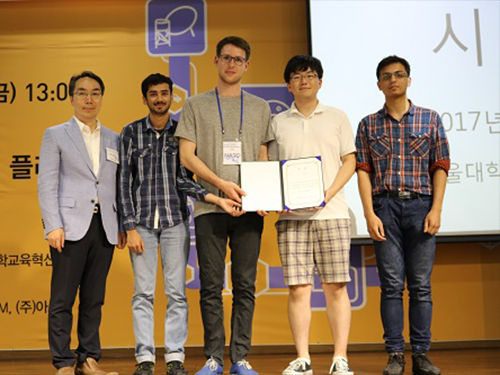 KATT Tops at Appropriate Technology Competition
The KAIST Appropriate Technology Team (KATT) consisting of KAIST international students received gold and bronze awards at ‘the 9th Creative Design Competition for the Other 90%’. This year’s competition was hosted by the Ministry of Science, ICT and Future Planning at Seoul National University’s Global Convention Plaza on May 26. Undergraduate and graduate students nationwide formed 65 teams to participate in the competition.
The aim of the competition is to discover appropriate technology and sustainable design items to enhance quality of life for those with no or little access to science technology and its products around the world. This year’s competition categorized the designs into IT; water and energy; agriculture, hygiene, safety, and housing; and education. The teams were evaluated on their presentations and prototypes.
KATT produced alarm warning bracelets for people in developing countries and smart hybrid dryers for agricultural products. The alarm warning bracelets were designed for those living in tsunami risk zones; they use wireless communication technology to receive and transmit warning signals and can be produced for less than $4.
The smart hybrid dryers featured solar energy generation, aimed to help those with low income in subtropical, low-altitude regions with unstable climates, since there are currently no drying methods for agricultural products without direct exposure to sunlight. Therefore, the hybrid dryers allowed drying regardless of the weather, and thus increased the storage and distribution efficiency of agricultural products.
Ashar Alam from India who participated in developing the alarm warning bracelet said, “Through the appropriate technology club, I recognized problems in India that also affect neighboring countries such as Indonesia and Bangladesh. I wanted to actively use the science and technology knowledge I have accumulated in KAIST for the less fortunate.” He continued, “It was meaningful to develop the product using the respective talents of students from various countries with the spirit of developing appropriate technology.”
(Photo caption: Alarm warning bracelet team received the gold award)
2017.06.12 View 9054
KATT Tops at Appropriate Technology Competition
The KAIST Appropriate Technology Team (KATT) consisting of KAIST international students received gold and bronze awards at ‘the 9th Creative Design Competition for the Other 90%’. This year’s competition was hosted by the Ministry of Science, ICT and Future Planning at Seoul National University’s Global Convention Plaza on May 26. Undergraduate and graduate students nationwide formed 65 teams to participate in the competition.
The aim of the competition is to discover appropriate technology and sustainable design items to enhance quality of life for those with no or little access to science technology and its products around the world. This year’s competition categorized the designs into IT; water and energy; agriculture, hygiene, safety, and housing; and education. The teams were evaluated on their presentations and prototypes.
KATT produced alarm warning bracelets for people in developing countries and smart hybrid dryers for agricultural products. The alarm warning bracelets were designed for those living in tsunami risk zones; they use wireless communication technology to receive and transmit warning signals and can be produced for less than $4.
The smart hybrid dryers featured solar energy generation, aimed to help those with low income in subtropical, low-altitude regions with unstable climates, since there are currently no drying methods for agricultural products without direct exposure to sunlight. Therefore, the hybrid dryers allowed drying regardless of the weather, and thus increased the storage and distribution efficiency of agricultural products.
Ashar Alam from India who participated in developing the alarm warning bracelet said, “Through the appropriate technology club, I recognized problems in India that also affect neighboring countries such as Indonesia and Bangladesh. I wanted to actively use the science and technology knowledge I have accumulated in KAIST for the less fortunate.” He continued, “It was meaningful to develop the product using the respective talents of students from various countries with the spirit of developing appropriate technology.”
(Photo caption: Alarm warning bracelet team received the gold award)
2017.06.12 View 9054 -
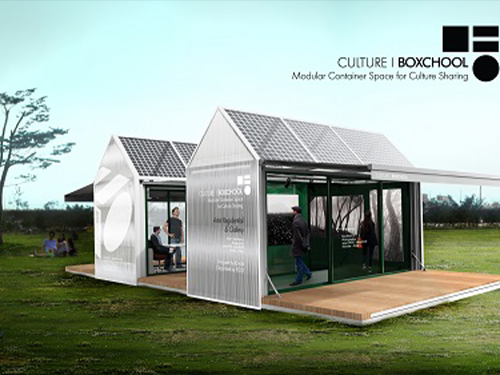 Prof. Sang-Min Bae Receives 2017 iF Design Award
Prof. Sang-Min Bae and his research team from the Industrial Design Department of KAIST submitted a winning entry to the 2017 iF Design Award named ‘Culture BOXCHOOL’.
The iF Design Award is an internationally renowned design contest that is recognized as one of the top three design awards in the world along with the Red Dot Design Award and the IDEA Design Award. It has been held annually by iF International Forum Design since 1953. A total of 5,575 entries from 59 countries entered the last competition.
Culture BOXCHOOL is a modular container space platform designed for culture sharing in isolated areas. It is delivered as a standard shipping container along with its subsidiary modular parts and it transforms into a gallery, office, or classroom. These modular parts build the interior and exterior by attaching them to the corner castings, which are standard parts on all shipping containers. Two Cultural BOXCHOOL containers can be transformed into three different types of layouts.
The containers can generate their own energy using solar panels that provide sustainable energy to equipment inside. Additionally, hot humid air can flow out through the attic vent, doors, and windows.
“With Culture BOXCHOOL, you can easily and quickly create spaces such as offices and classrooms, or you can easily disassemble and move them to another location.
Thus, it can provide everyone with equal educational opportunities and cultural enjoyment regardless of their geographical location. In addition, because it produces its own energy, it is expected to create a cultural space in a relatively harsh environment such as in developing countries. These social and economic values of Culture BOXCHOOL seem to be what led to us winning the contest. I will continue to strive to create the world’s best designs for needy people.” Professor Bae said.
The ID+IM design laboratory, a research team led by Professor Bae, has been studying philanthropy design since 2005, working on solving various problems throughout society through innovative design. They have received more than 50 awards from the most prestigious design competitions in the world.
2017.05.18 View 9861
Prof. Sang-Min Bae Receives 2017 iF Design Award
Prof. Sang-Min Bae and his research team from the Industrial Design Department of KAIST submitted a winning entry to the 2017 iF Design Award named ‘Culture BOXCHOOL’.
The iF Design Award is an internationally renowned design contest that is recognized as one of the top three design awards in the world along with the Red Dot Design Award and the IDEA Design Award. It has been held annually by iF International Forum Design since 1953. A total of 5,575 entries from 59 countries entered the last competition.
Culture BOXCHOOL is a modular container space platform designed for culture sharing in isolated areas. It is delivered as a standard shipping container along with its subsidiary modular parts and it transforms into a gallery, office, or classroom. These modular parts build the interior and exterior by attaching them to the corner castings, which are standard parts on all shipping containers. Two Cultural BOXCHOOL containers can be transformed into three different types of layouts.
The containers can generate their own energy using solar panels that provide sustainable energy to equipment inside. Additionally, hot humid air can flow out through the attic vent, doors, and windows.
“With Culture BOXCHOOL, you can easily and quickly create spaces such as offices and classrooms, or you can easily disassemble and move them to another location.
Thus, it can provide everyone with equal educational opportunities and cultural enjoyment regardless of their geographical location. In addition, because it produces its own energy, it is expected to create a cultural space in a relatively harsh environment such as in developing countries. These social and economic values of Culture BOXCHOOL seem to be what led to us winning the contest. I will continue to strive to create the world’s best designs for needy people.” Professor Bae said.
The ID+IM design laboratory, a research team led by Professor Bae, has been studying philanthropy design since 2005, working on solving various problems throughout society through innovative design. They have received more than 50 awards from the most prestigious design competitions in the world.
2017.05.18 View 9861 -
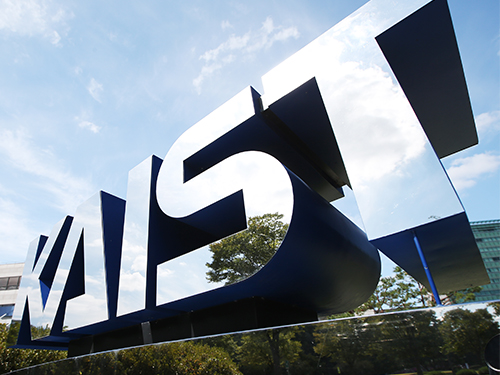 2017 Summer Nuclear Nonproliferation Education Program
The Nuclear Nonproliferation Education and Research Center (NEREC) at KAIST announced its 30 scholarship recipients for the 2017 Summer Nuclear Nonproliferation Education Program on April 18. The six-week program, starting from July 10, will be run in Korea, Japan, and China.
The program provides young global scholars with focused and challenging nuclear nonproliferation studies. Young scholars will be exposed to diverse science and technology policies and practices concurrently conducted in many countries and the future direction for enhancing nuclear nonproliferation. They will participate in a series of seminars, projects, international conferences, and field trips.
Since its launch in 2014, the program has educated 71 young scholars. This year, more than 150 scholars from 37 countries applied for the program, reflecting the growing reputation of the program both at home and abroad. The director of the NEREC, Professor Man-Sung Yim of the Department of Nuclear and Quantum Engineering at KAIST said that young scholars from very prestigious foreign universities have shown strong interest in the program. According to Professor Yim, this year’s recipients are from 26 universities from 16 countries including Harvard University, Oxford University, the National Research Nuclear University of Russia, and the Tokyo Institute of Technology
2017.04.19 View 10036
2017 Summer Nuclear Nonproliferation Education Program
The Nuclear Nonproliferation Education and Research Center (NEREC) at KAIST announced its 30 scholarship recipients for the 2017 Summer Nuclear Nonproliferation Education Program on April 18. The six-week program, starting from July 10, will be run in Korea, Japan, and China.
The program provides young global scholars with focused and challenging nuclear nonproliferation studies. Young scholars will be exposed to diverse science and technology policies and practices concurrently conducted in many countries and the future direction for enhancing nuclear nonproliferation. They will participate in a series of seminars, projects, international conferences, and field trips.
Since its launch in 2014, the program has educated 71 young scholars. This year, more than 150 scholars from 37 countries applied for the program, reflecting the growing reputation of the program both at home and abroad. The director of the NEREC, Professor Man-Sung Yim of the Department of Nuclear and Quantum Engineering at KAIST said that young scholars from very prestigious foreign universities have shown strong interest in the program. According to Professor Yim, this year’s recipients are from 26 universities from 16 countries including Harvard University, Oxford University, the National Research Nuclear University of Russia, and the Tokyo Institute of Technology
2017.04.19 View 10036 -
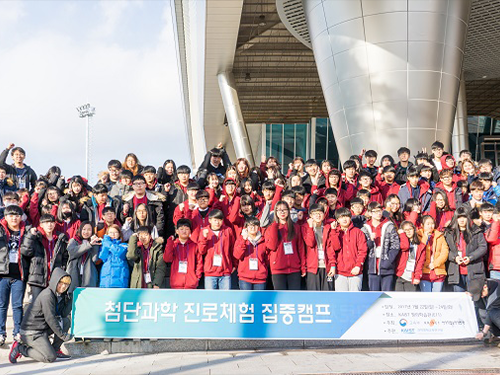 KAIST Intensive Science Camp for Middle-High School Students
The KAIST Global Institute of Talented Education (Director: Dong-Soo Kwon) invited around 90 middle and high school students for an advanced science intensive camp from January 22 to 24.
This camp targeted middle and high school students in community centers or child-care institutions. It aims to increase students’ interest in science and engineering, and assist them with their career paths through programs such as special lectures on science, advanced science projects, and career mentoring.
Participating students were divided into groups of seven or eight with a KAIST student as a mentor to conduct advanced science projects such as VR controller production and robot arm programming. The camp included exploring future career options and science and engineering college admission counselling.
Jiyoung Ryu, Research Professor for the KAIST Global Institute of Talented Education, said, “KAIST started the science and engineering career experience program in 2016 with the Ministry of Education and Korea Research Institute for Vocational Education and Training (KRIVET). So far, 6000 middle and high school students from around the country have participated. The camp is more meaningful since it educates students in social responsibility, in addition to the fields of science and engineering, both of which are missions and goals that KAIST strives for.” She continued to say, “We plan to continue to expand the program in the future.”
The KAIST Global Institute of Talented Education is actively conducting research and projects on national education for talented youth such as policy research concerning gifted education, science and engineering career education, advanced science camps, training for gifted education teachers, and cyber gifted education programs.
2017.02.01 View 9534
KAIST Intensive Science Camp for Middle-High School Students
The KAIST Global Institute of Talented Education (Director: Dong-Soo Kwon) invited around 90 middle and high school students for an advanced science intensive camp from January 22 to 24.
This camp targeted middle and high school students in community centers or child-care institutions. It aims to increase students’ interest in science and engineering, and assist them with their career paths through programs such as special lectures on science, advanced science projects, and career mentoring.
Participating students were divided into groups of seven or eight with a KAIST student as a mentor to conduct advanced science projects such as VR controller production and robot arm programming. The camp included exploring future career options and science and engineering college admission counselling.
Jiyoung Ryu, Research Professor for the KAIST Global Institute of Talented Education, said, “KAIST started the science and engineering career experience program in 2016 with the Ministry of Education and Korea Research Institute for Vocational Education and Training (KRIVET). So far, 6000 middle and high school students from around the country have participated. The camp is more meaningful since it educates students in social responsibility, in addition to the fields of science and engineering, both of which are missions and goals that KAIST strives for.” She continued to say, “We plan to continue to expand the program in the future.”
The KAIST Global Institute of Talented Education is actively conducting research and projects on national education for talented youth such as policy research concerning gifted education, science and engineering career education, advanced science camps, training for gifted education teachers, and cyber gifted education programs.
2017.02.01 View 9534 -
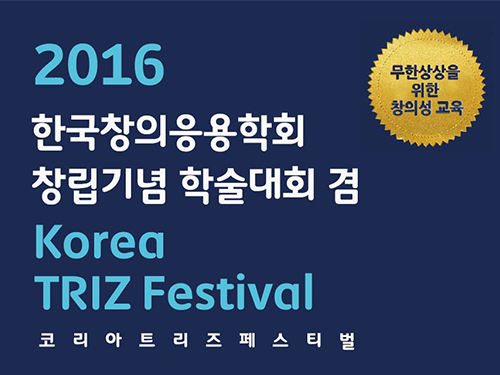 Symposium on Creative Education
KAIST and the Korea Society for Creativity and Application (KSCA) co-hosted a symposium on creative education on January 21, 2016 at the KAIST Business and Management College in Seoul. Along with the symposium, the two organizations also held the Korea "Theory of Inventive Problem Solving" (TRIZ) Festival 2016.
Around 200 experts from academia, industry, and research including Dong-Suk Kim, Dean of the KAIST College of Business and Management and Gui-Chan Park, Director of POSCO Group Academy, attended the symposium.
The event was organized to celebrate the foundation of KSCA and to increase social awareness of creative education and design-related thinking with a "TRIZ approach."
"TRIZ" stands for the “Theory of Inventive Problem Solving” in Russian. It is a problem-solving method based on logic and data, not intuition, which accelerates the project team’s ability to work out issues creatively. The "TRIZ approach" has been widely used among Korean companies including Samsung, LG, and POSCO as a means of boosting employees’ creativity.
The academic symposium was divided into a keynote speech, paper presentations from each field, and a poster fair.
Professor Dae-Sik Kim from KAIST delivered a keynote speech on “Neuroscience and Creativity,” offering a glimpse of the world from a neuroscience perspective. Jae-min Lee, a researcher at Samsung Electronics, provided an industrial case study, “Application of TRIZ for the Improvement of Refrigerator.” Professor Jung-Seok Hyun from Jeju University and Dr. Jung-Ho Shin from E-Triz System presented their application of TRIZ on “Limitless Imagination and Invention Class for the Elementary School Students.” Altogether, 36 other research papers and case studies were presented at the symposium.
Dr. Dong-ryul Yang, President of KSCA, said, “This academic symposium allows us to discuss a range of innovative case studies that utilize TRIZ in industrial and educational fields, from which we can learn good lessons and practices.”
2016.01.19 View 7526
Symposium on Creative Education
KAIST and the Korea Society for Creativity and Application (KSCA) co-hosted a symposium on creative education on January 21, 2016 at the KAIST Business and Management College in Seoul. Along with the symposium, the two organizations also held the Korea "Theory of Inventive Problem Solving" (TRIZ) Festival 2016.
Around 200 experts from academia, industry, and research including Dong-Suk Kim, Dean of the KAIST College of Business and Management and Gui-Chan Park, Director of POSCO Group Academy, attended the symposium.
The event was organized to celebrate the foundation of KSCA and to increase social awareness of creative education and design-related thinking with a "TRIZ approach."
"TRIZ" stands for the “Theory of Inventive Problem Solving” in Russian. It is a problem-solving method based on logic and data, not intuition, which accelerates the project team’s ability to work out issues creatively. The "TRIZ approach" has been widely used among Korean companies including Samsung, LG, and POSCO as a means of boosting employees’ creativity.
The academic symposium was divided into a keynote speech, paper presentations from each field, and a poster fair.
Professor Dae-Sik Kim from KAIST delivered a keynote speech on “Neuroscience and Creativity,” offering a glimpse of the world from a neuroscience perspective. Jae-min Lee, a researcher at Samsung Electronics, provided an industrial case study, “Application of TRIZ for the Improvement of Refrigerator.” Professor Jung-Seok Hyun from Jeju University and Dr. Jung-Ho Shin from E-Triz System presented their application of TRIZ on “Limitless Imagination and Invention Class for the Elementary School Students.” Altogether, 36 other research papers and case studies were presented at the symposium.
Dr. Dong-ryul Yang, President of KSCA, said, “This academic symposium allows us to discuss a range of innovative case studies that utilize TRIZ in industrial and educational fields, from which we can learn good lessons and practices.”
2016.01.19 View 7526 -
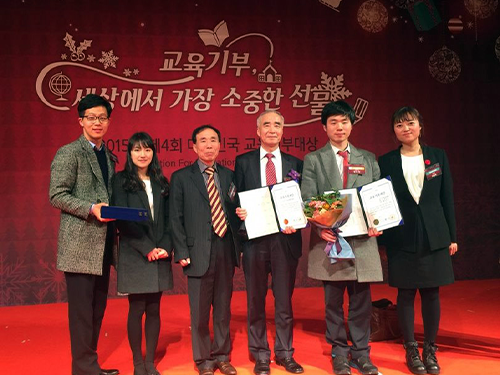 KAIST Wins the Korea Donation for Education Awards 2015
KAIST received the grand prize for the university section at the Korea Donation for Education Awards 2015. The award ceremony took place at Seoul Plaza Hotel on December 15, 2015.
The Ministry of Education created the award in 2012 to raise awareness about the need for charitable donations for education and to encourage the public’s participation in such endeavors. Recipients have included private companies, public institutions, non-profit organizations, universities, and individuals who have made notable contributions to education, for example, by offering educational programs or fundraising for such programs throughout a year.
Many organizations within KAIST, including the KAIST Center of Donation for Education, the Midam Scholarship Committee, the Donation for Software Education Group, the Chalk Academy, KAIST Student Volunteers, and K-LET, have been collectively recognized for their efforts to develop educational materials and managing academic camps and programs.
In addition to the grand prize which KAIST won, the Ministry of Education gave Neung-In Jang, a student pursuing a social entrepreneurship MBA at KAIST, an award for his efforts to provide quality education to teenagers by establishing the Midam Scholarship Committee in 2009. The Scholarship aims to revitalize the culture of donation for education by offering free math and science classes to high school students who are less privileged and by inspiring other universities in Korea to follow suit the committee’s volunteering activities.
2015.12.22 View 11129
KAIST Wins the Korea Donation for Education Awards 2015
KAIST received the grand prize for the university section at the Korea Donation for Education Awards 2015. The award ceremony took place at Seoul Plaza Hotel on December 15, 2015.
The Ministry of Education created the award in 2012 to raise awareness about the need for charitable donations for education and to encourage the public’s participation in such endeavors. Recipients have included private companies, public institutions, non-profit organizations, universities, and individuals who have made notable contributions to education, for example, by offering educational programs or fundraising for such programs throughout a year.
Many organizations within KAIST, including the KAIST Center of Donation for Education, the Midam Scholarship Committee, the Donation for Software Education Group, the Chalk Academy, KAIST Student Volunteers, and K-LET, have been collectively recognized for their efforts to develop educational materials and managing academic camps and programs.
In addition to the grand prize which KAIST won, the Ministry of Education gave Neung-In Jang, a student pursuing a social entrepreneurship MBA at KAIST, an award for his efforts to provide quality education to teenagers by establishing the Midam Scholarship Committee in 2009. The Scholarship aims to revitalize the culture of donation for education by offering free math and science classes to high school students who are less privileged and by inspiring other universities in Korea to follow suit the committee’s volunteering activities.
2015.12.22 View 11129